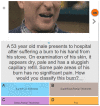Let's Escape Didactics: Virtual Escape Room as a Didactic Modality in Residency
- PMID: 37465713
- PMCID: PMC10332780
- DOI: 10.21980/J8CH2X
Let's Escape Didactics: Virtual Escape Room as a Didactic Modality in Residency
Abstract
Audience: The virtual escape room is a didactic activity for emergency medicine residents (interns, junior residents, senior residents).
Introduction: Residency programs are employing a wide variety of active learning techniques to engage their learners, including large-group discussion, small-group activities, team-based learning, gamification, problem-based learning, role-playing and case studies. In recent years, educators have drawn their attention to educational escape rooms, a new type of learning activity that utilizes collaborative learning activities to foster creating thinking, communication, teamwork and leadership.1-3 There have been a number of cases in medicine, 4,5 but there have been limited works published on the use of virtual educational escape rooms in residency education.Unfortunately, the COVID pandemic has made participation in an escape room more difficult. In lieu of social distancing during the COVID pandemic, participation in a virtual escape room is an effective and flexible learning modality for resident didactics that appears to promote participant satisfaction, competency, learning, and engagement.
Educational objectives: By the end of the activity, learners should be able to:Identify the hazardous chemicals associated with house firesClassify burn injury according to depth, extent and severity based on established standardsRecall the actions to take in response to fire emergencies (R.A.C.E. and P.A.S.S. acronyms)Recall key laboratory features of cyanide and carbon monoxide poisoningsIdentify appropriate management strategies for smoke inhalation injuriesRecite the treatment for cyanide and carbon monoxide poisoningsDescribe the management of the burn injuriesCommunicate and collaborate as a team to arrive at solutions of problemsDisplay task-switching and leadership skills during exerciseEvaluate virtual escape room experience.
Educational methods: Emergent care of burns, a popular and shared topic in both Emergency Medicine and Family Medicine literature, was chosen and educational objectives were developed. The website Deck.Toys was utilized to formulate the escape room along with puzzles around the educational objectives. Students congregated remotely on Zoom, and after instructions, were separated into teams to solve content-specific puzzles in order to escape the room. Teams which solve all the puzzles in the allotted time were considered to have successfully escaped the room. After the allotted time, the faculty led debriefing, and topic discussion occurred.
Research methods: Sixty-three participants composed of residents (24 emergency [EM], 29 family medicine [FM], 4 combined emergency and family medicine [EM/FM]), advanced practice practitioner trainees (2 EM), and faculty member participants (4 FMP) partook in the virtual escape room experience. At the end of the activity, a 17-item survey using Likert-scale questions was embedded in order to obtain feedback regarding satisfaction, engagement, learning, and medical competency in communication, collaboration, task-switching, and leadership skills.
Results: Eighteen out of 63 participants filled out the survey. This was the first virtual escape room experience for 94% of the respondents. A majority (88.9%) of respondents enjoyed the virtual escape room, finding it fun, interesting, engaging, and interactive. None of the respondents preferred traditional didactics over the virtual escape room activity, and 72% were either just as or equally as satisfied with virtual compared to in-person escape rooms. Nearly all respondents agreed that the activity encouraged collaboration, communication skills, task-switching, and leadership skills (94.4%, 88.9%, 72.2%, 72.2%, respectively).
Discussion: Participation in a virtual escape room is an effective and flexible learning modality for resident didactics that appears to promote learner satisfaction and engagement. The escape room also promoted important competencies encouraged during residency, such as interpersonal and communication skills and practice-based learning and improvement, and is an effective addition to virtual learning tools.
Topics: Small group activity, team-building exercise, remote learning, virtual learning, educational games, gamification, medical education, escape room, millennials, student engagement, adult learning theory, emergency medicine residents, family medicine residents, chemicals in house fires, smoke inhalation injuries, burn classification, burn injury management, carbon monoxide poisoning, cyanide poisoning, R.A.C.E. acronym, P.A.S.S. acronym, fluid resuscitation in burn patients, burn referrals.
© 2021 Turner, et al.
References
-
- López-Pernas S, Gordillo A, Barra E, Quemada J. Examining the use of an educational escape room for teaching programming in a higher education setting. IEEE Access. 7:31723–31737. doi: 10.1109/ACCESS.2019.2902976. - DOI
-
- Monaghan SR, Nicholson S. Bringing escape room concepts to pathophysiology case studies. HAPS Educ. 2017;21(2):49–65. doi: 10.21692/HAPS.2017.015. - DOI
-
- Boysen-Osborn M, Paradise S, Suchard J. The toxiscape hunt: an escape room-scavenger hunt for toxicology education. J Educ Teach Emerg Med. 2018;3(1):2018. doi: 10.21980/J8NW58. - DOI










